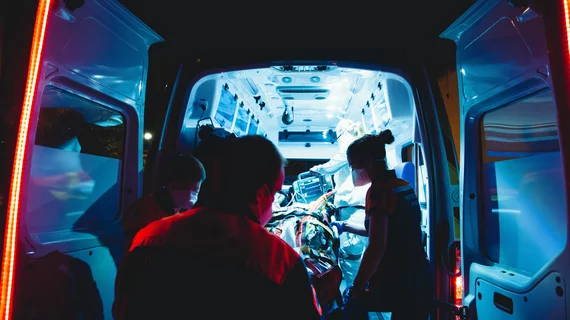AI could point first responders to ready, willing and able hospitals in real time
People suddenly stricken with a cardiovascular crisis often survive and recover as long as they’re transported ASAP to a hospital that has two attributes: expertise in emergency heart care and capacity to accommodate the incoming episode.
Machine learning could help paramedics and EMTs quickly thread that needle at the scene of first response, new research shows.
The study was conducted in South Korea and published April 6 in BMC Medical Informatics and Decision Making [1].
Researchers at Yonsei University College of Medicine in Seoul used three national databases and a pre-hospital cardiovascular registry representing more than 94,000 transported heart patients to develop a two-step prediction model with a machine learning algorithm.
‘A practical tool for pre-hospital care providers’
The team trained the model on 98 clinical characteristics identifiable at the scene by first responders as well as 13 characteristics of hospitals ready and able to deal with cardiovascular emergencies.
Retrospectively reviewing medical records, the prediction tool showed some 1,800 of the transported patients (6.26%) were taken to hospitals incapable of handling the emergency.
In their discussion the authors comment that a primary role of pre-hospital care is “not only the prediction of a patient’s critical condition but also a timely transfer to an optimal hospital that can resolve this condition. Therefore, our model is designed to be a practical tool for pre-hospital care providers’ use in the field.”
What would make a hospital optimally suited to take on a cardiovascular emergency? Three factors:
- Real-time crowding status of not only the ED but also inpatient beds,
- Distance from the scene of the emergency and
- Treatment capacity, including expertise in percutaneous coronary intervention (PCI).
Call for a digital platform to share real-time hospital information
The authors acknowledge their hypothetical system’s dependence on the availability of real-time data on hospital crowding:
The prediction model’s feasibility can be guaranteed only when an algorithm can perform accurate predictions by rapidly processing real-time unstructured data that are automatically collected from the pre-hospital field. … For our results to be used as a basis to improve the pre-hospital care system in the real world, a digital platform for sharing real-time information should be developed, and additional prospective studies on its use are warranted.”
Also of note: In South Korea, the pre-hospital care system is overseen by the National Fire Agency, which requires all field staff to receive 40 hours of training per year in medical skills and knowledge.
The study is available in full for free.

